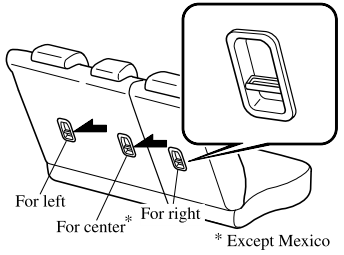Mazda CX-3: When Driving / Manual Transaxle Operation
Manual Transaxle Shift Pattern

The shift pattern of the transaxle is conventional, as shown.
Depress the clutch pedal all the way down while shifting; then release it slowly.
Your vehicle is equipped with a device to prevent shifting to R (reverse) by mistake. Push the shift lever downward and shift to R.

WARNING
Do not use sudden engine braking on slippery road surfaces or at high speeds: Shifting down while driving on wet, snowy, or frozen roads, or while driving at high speeds causes sudden engine braking, which is dangerous. The sudden change in tire speed could cause the tires to skid. This could lead to loss of vehicle control and an accident.
Always leave the shift lever in 1 or R position and set the parking brake when leaving the vehicle unattended: Otherwise the vehicle could move and cause an accident.
CAUTION
- Keep your foot off the clutch pedal except when shifting gears. Also, do not use the clutch to hold the vehicle on an upgrade. Riding the clutch will cause needless clutch wear and damage.
- Do not apply any excessive lateral force to the shift lever when changing from 5th to 4th gear. This could lead to the accidental selection of 2nd gear, which could result in damage to the transaxle.
- Make sure the vehicle comes to a complete stop before shifting to R. Shifting to R while the vehicle is still moving may damage the transaxle.
NOTE
- If shifting to R is difficult, shift back into neutral, release the clutch pedal, and try again.
 Low Engine Coolant Temperature Indicator Light (Blue)
Low Engine Coolant Temperature Indicator Light (Blue)
The light illuminates continuously when
the engine coolant temperature is low and
turns off after the engine is warm.
If the low engine coolant temperature
indicator light remains illuminated after
the engine has been sufficiently warmed
up, the temperature sensor could have a
malfunction...
 Gear Shift Indicator (GSI)
Gear Shift Indicator (GSI)
The GSI supports you to obtain optimum
fuel economy and smooth driving. It
displays the selected gear position in the
instrument cluster as well as notifies the
driver to change to the most suitable gear
position corresponding to the actual
driving condition...
Other information:
Mazda CX-3 (2015-2026) Owner's Manual: Recording of Vehicle Data
This vehicle is equipped with a computer which records the following main vehicle data related to vehicle controls, operation, and other driving conditions. Recorded data Vehicle conditions such as engine speed and vehicle speed Driving operation conditions such as accelerator and brake pedals, and information related to the environmental circumstances while the vehicle is driven Malfunction diagnosis information from each on-vehicle computer Information related to controls of other on-vehicle computers NOTE The recorded data may vary depending on the vehicle grade and optional equipment...
Mazda CX-3 (2015-2026) Owner's Manual: Clock
Setting the time The clock can be set at any time when the ignition is switched to ACC or ON. To adjust the time, press the clock button for about 2 seconds until a beep is heard. The clock's current time will flash.Time adjustment To adjust the time, press the hour/ minute set button while the clock's current time is flashing...
Categories
- Manuals Home
- Mazda CX-3 Owners Manual
- Mazda CX-3 Service Manual
- Warning Lights
- TCS OFF Switch
- Speedometer
- New on site
- Most important about car
Anchor Bracket
Anchor brackets for securing child-restraint systems are equipped in the vehicle. Locate each anchor position using the illustration.
To install a child-restraint system, remove the head restraint. Always follow the instruction manual accompanying the child-restraint system.
Anchor bracket location
Use the indicated anchor bracket locations when installing a child-restraint system equipped with a tether.

